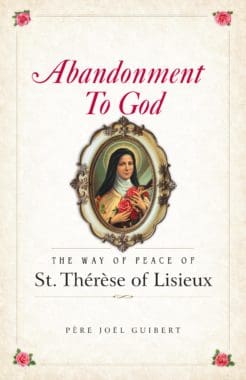“Providence” is a word that needs to be given a new meaning because it has been forgotten or caricatured to such an extent. For many people, providence conjures up only a “palliative” for the ends of months that are a little difficult. Just as “irrigation” minimized agricultural wastes, the abundance in our society has finally freed man from believing in God: “Come on, sir, let’s get with it. You are not really going to trust this ‘gentle dreamer’ named Jesus, who asserts that you must not worry about anything, that God takes care of it?”
To turn away from faith in providence, as soon as this word is blurted out, we hasten to caricature it, not in a mean way, but simply by regurgitating the atmosphere of the times we are living in: “Do you still believe in a God who would determine in advance everything that will happen to you, without letting your liberty have any say in it? Do you still believe in a God who seems indifferent to evil and the suffering of men?” The weight of these caricatures certainly assures them of a long career, but if we dare to allow Providence to speak for Himself, we will have some surprises, some good surprises!
God did not content Himself with creating the world in the way that one builds something out of Legos and then leaves it: “Dear creatures, here is the Christmas present, have fun, and, above all, do not bother me; my divine job has ended!” Certainly, in each instance, God “carries” His creation, but in His love, the Trinity “carries” us as part of a benevolent plan: “All historical events unfold according to the will or permission of divine Providence, and God attains His objectives in history.”
Certain people will prefer this simpler formula to the more technical expression “Providential plan of God”: “God the Father has a personal plan of love for my life!” The whole object of this book resides in the response to this question: “Do I want to enter into this very concrete plan of love that God has for my life through an abandonment that is confident and active?” Unfortunately, our wounded unreflective minds often convey this false image of an active God presiding over the life of men from very high up and very far above. No, Providence implicates Himself in the smallest details of our lives: “The witness of Scripture is unanimous that the solicitude of divine providence is concrete and immediate; God cares for all, from the least things to the great events of the world and of history,” the Catechism of the Catholic Church (CCC) tells us (303). If this is the case, what space and what great love we can give to the smallest details of our lives! “Everything is so big in religion. . . . To pick up a pin out of love can convert a soul. What a mystery!” Thérèse marvels.
Modern man, having removed God from his life, seems to be more and more desperate in facing the history of this world, which appears to be more a state of confusion than a marvelous design coming from the hands of a “good God.” Today, it is difficult for many to affirm that God is the Lord of history. But “we firmly believe that God is master of the world and of its history” (CCC 314). Let us not be afraid to “proclaim the word . . . whether it is convenient or inconvenient” (2 Tim. 4:2); let us proclaim this truth of faith, — lest, on the Day of Judgment, we be accused of not helping a society in danger of despair! The dogma of providence is a “truth to be lived out,” a truth that changes life. Abandonment to the God of love renews life by injecting it with an immense hope. It offers meaning — perhaps the ultimate meaning of the history of the world and of our lives.
This discovery, or rediscovery, of a God who is very near men’s lives, has perhaps already allowed for the growth of the idea of providence. Now let us confront two difficulties that frequently prevent us from abandoning ourselves to God: 1.) If God has a plan of love for my life, am I still free? 2.) How can I have confidence in this plan of God for my life when evil and suffering befall me?
If God has a plan of love, what happens to my freedom?
How does one reconcile a providential plan that God knows from all eternity — “the definite plan and foreknowledge of God” (Acts 2:23) — with a human freedom that is worthy of that name — that is to say, fully free?
Let us leave aside the scenario of a providential plan that is about “predestination.” In this scenario, God has so well determined things that certain people would be predestined from all eternity to be happy, whereas others would be predestined to experience eternal punishment, even before exercising their freedom. If this were the case, we would not be God’s friends (John 15:15) but rather His toys, on which this perverse tyrant would get away with all kinds of whims. No, God has a favorable plan for everyone because He is Love. This plan fully includes and infinitely respects the exercise of our freedom: “God is the master of history. But despite that, He conceived it in such a way as to allow freedom to play its role.”
First & Secondary Causes
God is really the sovereign Master of His plan of love and, to carry it out, He calls upon His creatures, who are “secondary causes.” “God is the first cause who operates in and through secondary causes” (CCC 308). Thus, the sun is a secondary cause, which allows for the conditions of human existence on earth. Through the act of procreation and the love that they manifest, parents are the secondary causes of their children. In this way, they allow the free love of God to show through.
Thérèse confided about the witness of her father in prayer: “Then we all went upstairs to say our night prayers together and the little Queen was alone near her King, having only to look at him to see how the saints pray.” Let us go further on. Even a disagreeable person can be a secondary cause when, through a biting remark, he teaches us to be healed of our pride!
We have a hard time thinking of God — who would act in man without limiting his freedom — as a First Cause, who would work through secondary causes.
God does not quash our freedom. We often convey this wounded vision of the omnipotence of God, who could only squash our poor, limited freedom like a bulldozer. Yes, God is omnipotent and capable of creating worlds! But His power is such that it can penetrate man’s liberty without ever assaulting it: “Do not think that you are drawn against your will; the will is drawn also by love and delight,” Saint Augustine so magnificently says in commenting on John 6:44. Not only is our freedom not squashed by God’s, but it is also elevated to a divine dignity, since God makes us co-workers (1 Corinthians 3:9) in His benevolent plan.
God does not compete with our freedom. Nor is there competition between God and man like the game musical chairs, in which there is only one chair, and if God were to take it, man would lose his freedom to sit down. No, God acts in man. The chair is one-hundred percent God’s and 100 percent man’s. “God acts in every agent.” There is cooperation, but on two levels; the secondary cause’s action cannot be put on the level of God, who is the First Cause. Thus, it is not necessary to take the trouble to “catch God” acting in our lives, directly or through secondary causes, for His action will always be “other” than human action, which we will not notice with our human eyes. So, if I choose to abandon myself to God, my freedom will not suffer from it. On the contrary, it will increase!
If the sovereign freedom of God constantly mingles with man’s freedom, let us not be astonished if the Bible or the saints seem to attribute everything that happens to them directly to God, while often not paying much attention to secondary causes: “The Holy Spirit, the principal author of Sacred Scripture, often attributes actions to God without mentioning any secondary causes. This is not a ‘primitive mode of speech,’ but a profound way of recalling God’s primacy and absolute Lordship over history and the world.” It so happens that certain highly intellectual people look at the Scriptures or the words of the saints from on high, as if their language lacks a scientific rigor. It is this haughty judgment that has scales in its eyes. It confines reality to appearances while denying the One who places it in human beings at all times. A saint really deserves to be called an “illuminated one.” He is far from hovering in unreality. His eagle look allows him to pierce reality to the point of discerning the providential hand of the Father behind what is visible.
God, Master of history, and man, master of his liberty
Considering God and man’s freedom already confronts us with the mystery of evil. The freedom of creatures — men and fallen angels — is such that they can choose evil. How can God achieve His plan of love if His creatures use their liberty to sin?
Man, who is perfectly free, even if he works to destroy God’s plan of love, nonetheless collaborates with it indirectly, since God is capable of mysteriously using for a greater good the evil that is committed: “God is the master of history. But despite that, he conceived it in such a way as to let freedom play out its role. So, it is possible for me to move away from His plan for me. . . . God, on the one hand, fully accepts freedom and, on the other hand, He is so great that He can transform failure and destruction into a new beginning that even surpasses these and appears to be greater and better.”
Can we say the same thing about the energy-sapping work of the fallen angels — the demons? Yes, it is the paradox noted by Goethe in this description: [Satan], the one who always wants evil and always does good. The Devil and his band devastate in vain, for their evil action is “integrated” into the mysterious plan of salvation. “Even with those who do not do what He wants, God does what He wants.” We must contemplate Christ the Conqueror to discover such astonishing perspectives!
+
This article is adapted from a chapter in Abandonment to God by Fr. Joel Guibert, which is available from Sophia Institute Press.
 Art for this post on St. Therese’s Method for Peace: Cover and interior images used with permission
Art for this post on St. Therese’s Method for Peace: Cover and interior images used with permission




